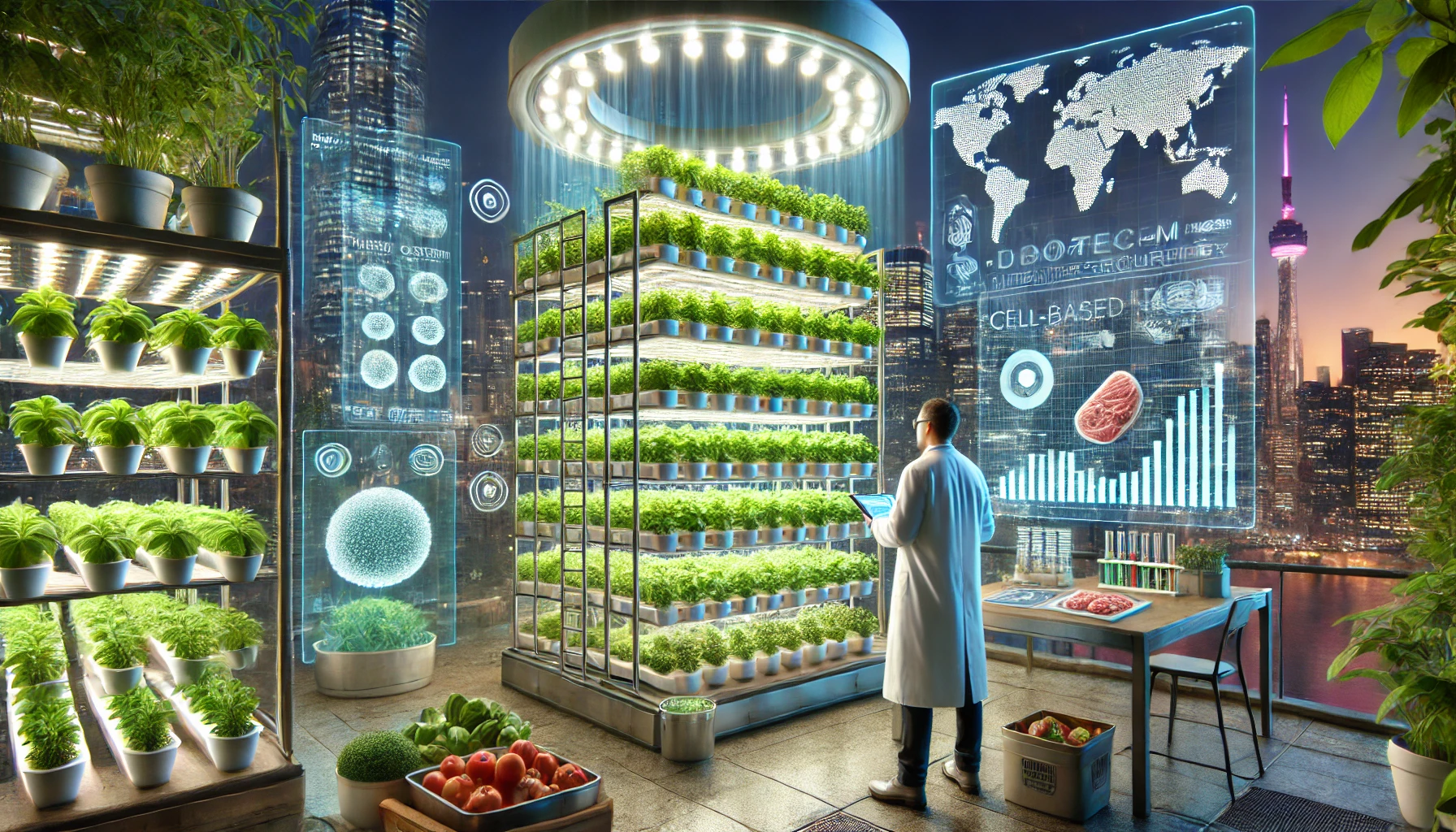Biotech Innovations for Food Security: How Cell-Based Agriculture and Vertical Farming are Revolutionizing Urban Food Systems

Why Biotech in Urban Food Security Matters Today
Food security is a mounting concern as cities grow faster than ever, challenging traditional supply chains. Urban areas often rely on long-distance supply chains vulnerable to disruptions, climate change, and land scarcity. Biotech solutions like cell-based agriculture and vertical farming offer transformative ways to produce food locally, ensuring urban resilience against food scarcity. In this article, we’ll explore the latest biotech innovations tackling these challenges head-on, from lab-grown meats to hydroponic crops, examining how they aim to make cities self-sustaining food hubs.
Tracing the Roots of Biotech in Urban Agriculture: From Concept to Reality
The journey of biotech in agriculture has been long, beginning with selective breeding and crop engineering. Over the past two decades, urban farming concepts have gained traction, with biotech-driven solutions evolving to address unique city challenges. Innovations like cell-based meat date back to early experiments in lab-grown protein by researchers like Dr. Mark Post, who introduced the first lab-grown burger in 2013. This field has since expanded dramatically, with startups bringing this technology closer to consumers. By solving the 'food desert' issue, biotech is creating a paradigm shift, bringing farms into city centers and revolutionizing how food reaches urban populations.
Overcoming Key Challenges in Urban Biotech Food Solutions
Biotech in urban agriculture faces significant barriers, both financial and logistical. High development costs of cell-based meat production currently make it a premium product. Vertical farms, despite their promise, struggle with energy consumption due to artificial lighting requirements. A recent report highlighted that vertical farms can consume over 50 times more electricity than traditional farms, though innovations in renewable energy integration offer some relief. Regulatory constraints also pose challenges, as approvals for biotech foods vary greatly by region, complicating scalability. Finally, consumer acceptance remains a hurdle; a 2023 study found that 36% of consumers remain hesitant about lab-grown meat. Solving these challenges is essential for biotech to become a staple in urban food security.
Real-World Examples: How Biotech is Transforming Urban Food Security
Around the world, biotech startups are putting these theories into practice. In the U.S., Upside Foods has pioneered lab-grown poultry, achieving FDA approval and setting the stage for market expansion. The Singaporean vertical farm, Sky Greens, uses low-water and low-energy techniques to produce leafy greens in dense urban areas, addressing Singapore's high dependency on food imports. In Japan, the company Spread Co. has taken vertical farming to new heights, producing pesticide-free lettuce through fully automated processes that reduce human intervention. Each of these examples shows how biotech can adapt to urban contexts, creating scalable food sources that are sustainable, safe, and accessible.
Successful Practices and Innovative Solutions in Urban Biotech Agriculture
To address the challenges of scalability, many biotech companies are implementing closed-loop systems that conserve water and nutrients, a critical feature in water-scarce urban areas. Advanced LED lighting now mimics sunlight effectively, significantly reducing energy costs, while solar-powered farms are emerging to further cut down on environmental impact. IoT and AI are also transforming vertical farms by automating climate controls and crop monitoring, making it easier to grow high-yield crops in controlled environments. Collaborations between biotech firms and local governments are essential, with policy support helping ease the path to market for new biotech products. By adopting these practices, urban farming can become a feasible, sustainable alternative to rural agriculture.
The Future of Biotech in Urban Agriculture: Trends and Potential Impacts
Emerging trends in biotech are set to redefine food production in cities. Cellular agriculture is expanding beyond meat to other animal products like dairy, eggs, and even seafood, potentially changing entire sectors of the food industry. Vertical farms are also evolving, with AI-driven precision agriculture enabling autonomous operations that reduce labor costs and optimize resource use. In the near future, blockchain technology could be integrated into urban biotech, enhancing transparency in food supply chains. These advancements signal a future where cities could self-sufficiently produce a wide range of foods, boosting urban resilience and significantly reducing environmental impact. Biotech innovations promise a new era of urban sustainability, impacting not only food security but also public health, employment, and economic stability in urban areas.
Conclusion: Embracing Biotech for a Resilient Urban Food Future
The role of biotech in urban food security is growing more significant with each passing year. As urban populations rise, the need for reliable, local food sources becomes paramount. By adopting cell-based agriculture and vertical farming, cities can address these challenges, ensuring a sustainable and resilient food supply. Biotech offers scalable solutions, capable of feeding urban populations without the heavy environmental footprint of traditional agriculture. What are your thoughts on these biotech innovations? Could they be the future of urban food security? Share your thoughts and join the discussion on Reddit or Twitter!



